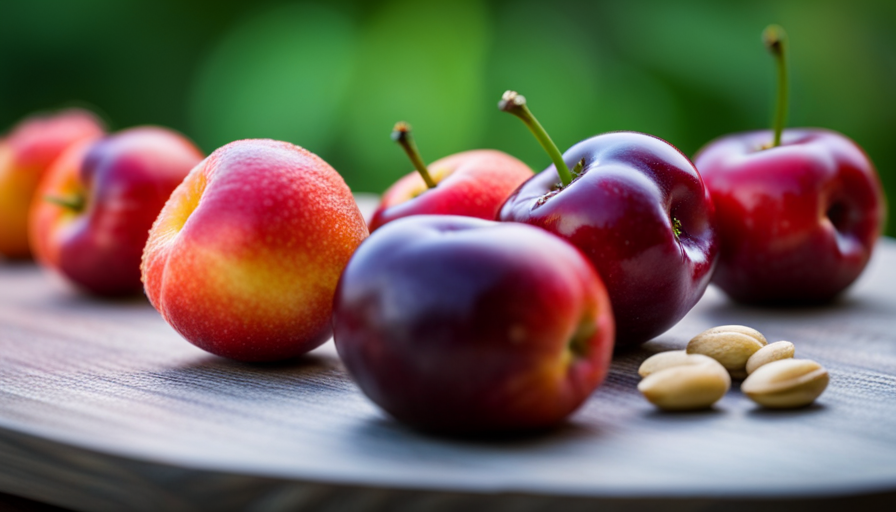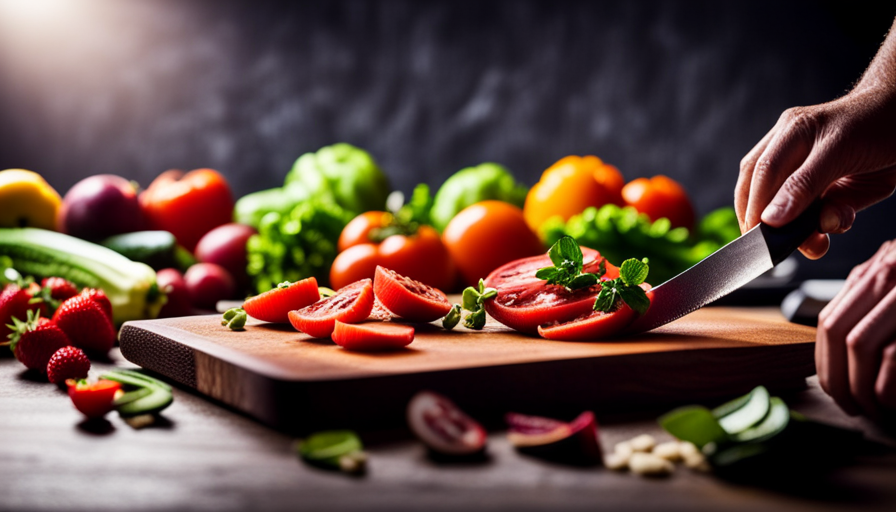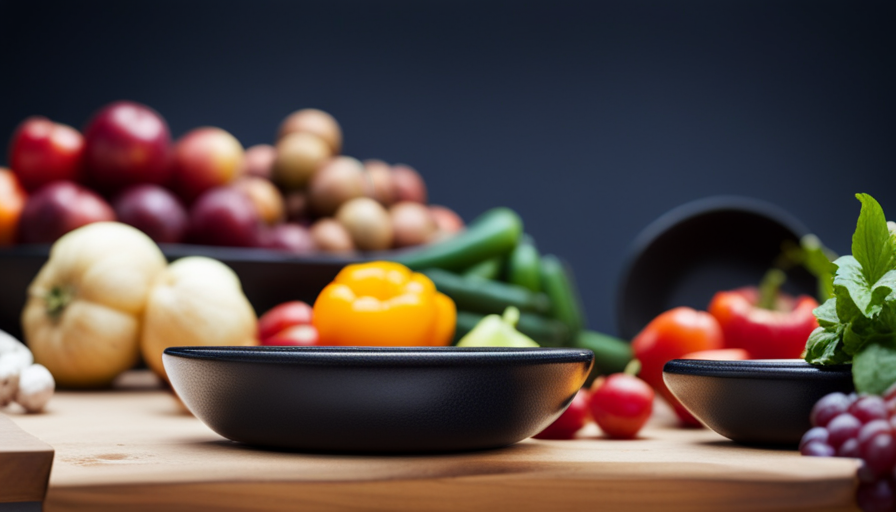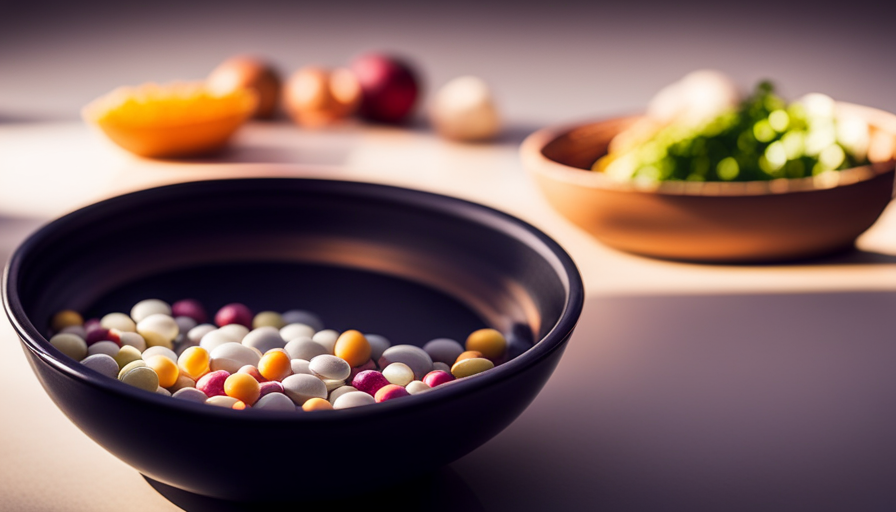You’ve heard the saying: “A moment on the lips, a lifetime in the stomach.” This is especially true when it comes to indulging in certain sugary delights.
As a self-proclaimed sweet tooth, I’ve always been captivated by the magic that happens in the kitchen. The alchemy of flour, sugar, and butter coming together to create delectable desserts is truly a wonder. But as much as I love indulging in the finished product, I can’t help but wonder about the dangers that lurk in the raw batter.
In this article, we will delve into the world of sweet genius foods that are toxic when consumed raw. From the hidden dangers of raw cookie dough to the surprising risks of raw pie dough, we will uncover the truth behind these tempting treats.
Prepare to be shocked as we explore the science and facts behind why these seemingly innocent batters can pose serious health risks. So, before you reach for that spoon to taste-test your latest baking creation, read on to discover the hidden dangers that may be lurking in your favorite sweet treats.
Key Takeaways
- Raw cookie dough and cake batter can contain harmful bacteria like Salmonella and should not be consumed.
- Baking cookie dough and cake batter at a high temperature kills off bacteria and makes it safe to consume.
- Edible cookie dough products without raw eggs are available as a safer alternative to raw cookie dough.
- Consuming raw cake batter, brownie batter, pie dough, or cheesecake batter increases the risk of Salmonella and E. coli infections.
The Hidden Dangers of Raw Cookie Dough
You might think it’s harmless, but indulging in raw cookie dough can be a dangerous choice due to the hidden dangers it poses. While the temptation to sneak a taste of the dough before baking is hard to resist, it’s important to understand the risks involved.
Raw cookie dough contains raw eggs, which can harbor harmful bacteria like Salmonella. Baking the dough at a high temperature kills off these bacteria, making the final product safe to consume.
The health benefits of baking go beyond just killing off bacteria. Baking cookie dough transforms it into a delicious treat with a crispy exterior and a soft, gooey center. The heat causes the ingredients to undergo chemical reactions, resulting in a mouth-watering aroma and flavor. Additionally, the process of baking creates a beautiful golden brown color that is visually appealing.
If you can’t resist the urge to eat cookie dough, there are alternatives to raw consumption. Many stores now offer edible cookie dough that’s specifically made to be eaten raw. These products are made without raw eggs and are safe to enjoy without worrying about potential health risks.
Moving on to the risks of consuming raw cake batter, it’s important to be aware of the potential dangers associated with this indulgence.
The Risks of Consuming Raw Cake Batter
Interestingly, consuming cake batter in its uncooked state can pose significant health risks due to the presence of raw eggs. The CDC reports that each year, there are an estimated 79,000 cases of Salmonella infection in the United States alone. Raw cake batter contains raw eggs, which may be contaminated with Salmonella, a bacteria that can cause food poisoning. When eggs are cooked, the heat kills any bacteria present, making them safe to consume. However, consuming raw batter increases the risk of Salmonella infection.
Precautions for consuming raw cake batter include avoiding tasting or consuming any raw batter that contains eggs. It’s essential to understand that even a small amount of raw batter can contain enough bacteria to cause illness. Additionally, it’s crucial to follow proper food handling and preparation techniques, such as washing hands thoroughly before and after handling eggs, refrigerating eggs promptly, and using pasteurized eggs when possible.
To highlight the risks of eating raw batter, consider the following:
- Raw eggs can be contaminated with Salmonella.
- Consuming raw batter increases the risk of food poisoning.
- Even a small amount of raw batter can contain enough bacteria to cause illness.
- Proper food handling and preparation techniques can help reduce the risk of infection.
- Pasteurized eggs are a safer alternative for recipes that call for raw eggs.
With these risks in mind, it’s important to understand the truth about raw brownie batter and how it can also pose potential health hazards.
The Truth About Raw Brownie Batter
Be cautious when indulging in the delightful temptation of raw brownie batter, as it may conceal hidden dangers that can compromise your well-being. While the taste of raw brownie batter is undeniably tempting, it is important to consider the potential health risks that come along with consuming it.
Raw brownie batter can contain harmful bacteria such as Salmonella and E. coli, which can lead to foodborne illnesses. These bacteria can be present in the raw eggs and flour used in the batter. Cooking the brownie batter at a high temperature kills these bacteria, making it safe to consume.
Cooking brownie batter not only eliminates the risk of bacterial contamination but also enhances its taste and texture. The heat transforms the ingredients, creating a rich and fudgy treat that is a delight to the senses. Additionally, cooking the batter allows the flavors to meld together, resulting in a more balanced and satisfying dessert.
For those who still crave a sweet treat without the risks, there are alternatives to raw brownie batter. Baking the brownie batter at a lower temperature for a longer time can create a gooey and moist texture, similar to that of raw batter. Alternatively, there are recipes available that use ingredients like avocado or black beans to create a healthier, yet still delicious, brownie.
While raw brownie batter may be tempting, it is important to prioritize your health and opt for the cooked version. The health benefits of cooked brownie batter are numerous, and there are alternatives available for dessert enthusiasts seeking a safer indulgence. Now, let’s explore the surprising dangers of raw pie dough.
The Surprising Dangers of Raw Pie Dough
Little do many people know, indulging in a bite of raw pie dough can pose unexpected hazards to your health. While it may be tempting to sneak a taste of the delicious dough before it goes into the oven, it’s crucial to understand the potential health risks associated with consuming raw dough products.
One of the main concerns with raw pie dough is the presence of raw eggs. Eggs can be contaminated with Salmonella, a bacteria that can cause food poisoning. When eggs aren’t properly cooked, this bacteria can survive and lead to symptoms such as diarrhea, abdominal cramps, and fever. It’s important to handle eggs with care and make sure they’re fully cooked before consumption.
Another risk factor in raw pie dough is the presence of uncooked flour. Raw flour can be a source of E. coli, a harmful bacteria that can cause severe illness. It’s essential to remember that flour is a raw agricultural product and should be treated as such. It’s recommended to avoid consuming raw flour or any dough that contains it.
To protect yourself from the potential health risks of consuming raw dough products, it’s crucial to practice proper food handling. This includes washing your hands thoroughly after handling raw ingredients and avoiding cross-contamination between raw and cooked foods. Additionally, it’s essential to follow recipe instructions and bake dough products at the recommended temperatures and times.
The importance of proper food handling can’t be stressed enough when it comes to raw pie dough. By understanding the potential health risks associated with consuming raw dough products, we can make informed decisions and protect our well-being.
Transitioning into the subsequent section, it’s equally important to be aware of the hidden risks of raw cheesecake batter.
The Hidden Risks of Raw Cheesecake Batter
I want to discuss the hidden risks of raw cheesecake batter, specifically focusing on the potential danger of raw eggs and the risk of food poisoning.
Raw eggs can contain bacteria such as Salmonella, which can cause serious illness if ingested.
To enjoy cheesecake batter safely, it’s important to use pasteurized eggs or egg substitutes, or to heat-treat the eggs before using them in the batter.
The Potential Danger of Raw Eggs
You might want to think twice before cracking open that raw egg, as it could be a ticking time bomb of potential danger. Raw eggs pose potential health risks due to the presence of bacteria such as Salmonella. To ensure your safety, consider these safe alternatives:
-
Cooking the eggs thoroughly: Heat destroys harmful bacteria, so cooking eggs until the yolk and whites are firm is a reliable way to eliminate the risk.
-
Using pasteurized eggs: Pasteurization kills bacteria while preserving the nutritional value of the eggs, making them a safe option for recipes that call for raw eggs.
-
Opting for egg substitutes: These products are made from egg whites and don’t contain the risk of bacterial contamination.
-
Using cooked egg products: Instead of using raw eggs, you can use cooked egg products such as egg whites or egg yolks, which are readily available in stores.
Raw eggs can be a breeding ground for bacteria, increasing the risk of food poisoning.
The Risk of Food Poisoning
Beware! Consuming undercooked eggs can be a recipe for disaster, putting you at risk of a nasty case of food poisoning. It’s crucial to prioritize safe food handling practices to prevent any potential health hazards.
When eggs are not fully cooked, they may contain harmful bacteria like Salmonella, which can cause food poisoning. Symptoms of food poisoning include nausea, vomiting, diarrhea, abdominal pain, and fever. These symptoms can occur within a few hours or up to several days after consuming contaminated food.
To ensure your safety, it’s important to handle eggs properly, washing your hands before and after handling them, and storing them in the refrigerator. Additionally, cooking eggs thoroughly until the yolk and white are solid is essential.
With this knowledge of the risks involved, let’s explore safe methods for enjoying cheesecake batter.
Safe Methods for Enjoying Cheesecake Batter
To safely enjoy cheesecake batter, remember to thoroughly cook the eggs to eliminate any potential risk of foodborne illnesses. When making cheesecake, there are alternative baking methods that can be used to ensure the eggs are fully cooked.
One method is to bake the cheesecake in a water bath, which helps distribute heat evenly and prevents overcooking. Another method is to use a lower temperature and longer baking time, allowing the eggs to cook gently.
If you prefer not to use raw eggs in your cheesecake batter, there are safe substitutions available. One option is to use pasteurized eggs, which have been treated to kill any potential bacteria. Another option is to use egg substitutes or a combination of cream cheese and yogurt for a creamy texture. It’s important to note that these substitutions may alter the flavor and texture of the cheesecake slightly, but they provide a safe alternative for those concerned about consuming raw eggs.
Transitioning into the next section about the dangers of eating raw cupcake batter, it’s important to remember that the same precautions should be taken with any raw batter or dough.
The Dangers of Eating Raw Cupcake Batter
Indulging in raw cupcake batter can be seriously harmful to your health. While it may be tempting to lick the spoon or sneak a taste before baking, it’s important to understand the potential dangers associated with consuming raw batter.
Proper food handling is crucial in preventing foodborne illnesses, and raw batter poses a risk due to the presence of raw eggs and flour. Raw eggs can contain salmonella, a bacteria that can cause severe gastrointestinal distress. Cooking eggs to a minimum internal temperature of 160°F kills this bacteria, but consuming raw eggs puts you at risk of infection. Additionally, raw flour can contain harmful bacteria such as E. coli, which can lead to food poisoning. Baking cupcakes at the recommended temperature and time ensures that both the eggs and flour are properly cooked, reducing the risk of contamination.
Fortunately, there are alternatives to indulging in raw batter. If you enjoy the taste of batter, consider using pasteurized eggs or egg substitutes, which have undergone a heating process to eliminate bacteria. You can also try making edible cookie dough recipes that are specifically designed to be consumed raw, as they often use heat-treated flour or exclude eggs altogether.
It’s crucial to prioritize proper food handling and avoid consuming raw cupcake batter. The risks associated with raw eggs and flour can lead to foodborne illnesses, which can have serious health consequences. So, resist the temptation and enjoy your cupcakes safely by waiting for them to bake fully.
Frequently Asked Questions
Can I safely eat raw cookie dough if it doesn’t contain eggs?
Yes, it’s generally safe to eat raw cookie dough if it doesn’t contain eggs. The main concern is salmonella from raw eggs, but without eggs, the risk is significantly reduced. It’s important to note that raw flour can still pose a risk of contamination with bacteria like E. coli. If you still want to enjoy a dough-like treat without the risks, there are alternatives available, such as edible cookie dough made with heat-treated flour and without eggs.
What are the potential health risks of consuming raw cake batter?
Consuming raw cake batter can pose potential dangers and health risks. Raw batter may contain harmful bacteria like Salmonella, which can cause foodborne illnesses such as diarrhea, vomiting, and abdominal cramps. Additionally, raw cake batter often contains raw eggs, which increases the risk of bacterial contamination. Consuming uncooked flour can also lead to infections caused by E. coli. Therefore, it’s advisable to avoid consuming raw cake batter to minimize these potential health risks.
Is it safe to eat raw brownie batter if it doesn’t contain raw eggs?
Yes, it’s generally safe to eat raw brownie batter if it doesn’t contain raw eggs. Raw eggs pose a risk of Salmonella contamination, which can cause food poisoning. However, without eggs, the risk of bacterial infection is significantly reduced.
To satisfy your cravings while avoiding raw eggs, you can also try alternative eggless cookie dough recipes, which are specifically designed to be eaten raw. Remember to always follow safe food handling practices to prevent any potential contamination.
Are there any potential dangers associated with eating raw pie dough?
Eating raw pie dough can pose potential dangers due to the presence of raw flour and uncooked ingredients. Raw flour may contain harmful bacteria like E. coli, which can cause food poisoning. Additionally, consuming unbaked ingredients such as eggs or dairy products can increase the risk of bacterial contamination. It’s crucial to bake the pie dough thoroughly to eliminate these potential hazards and ensure food safety.
What are the hidden risks of consuming raw cheesecake batter?
Consuming raw cheesecake batter can pose several risks. The main concern is the presence of raw eggs, which may contain harmful bacteria such as Salmonella. These bacteria can cause food poisoning, resulting in symptoms like fever, diarrhea, and abdominal pain.
Additionally, consuming raw batter may lead to an increased risk of contracting a foodborne illness. It’s recommended to bake the cheesecake thoroughly to eliminate any potential dangers associated with eating raw batter, similar to the risks of consuming raw pie dough.
What Sweet Genius Food Can Be Toxic When Raw?
Eating raw food can have both positive and negative effects on mental health. While certain raw fruits and veggies can be beneficial, some sweet genius foods like raw cassava and kidney beans contain toxins that can be harmful if not properly cooked. It’s important to know which raw foods to avoid for mental health safety.
Conclusion
In conclusion, it’s important to remember that indulging in the tempting taste of raw cookie dough, cake batter, brownie batter, pie dough, cheesecake batter, or cupcake batter can have serious consequences for our health.
While the idea of licking the spoon may seem harmless, the presence of raw eggs and uncooked flour poses a risk of bacterial contamination and foodborne illnesses.
Despite the temptation, it’s crucial to prioritize our well-being and opt for fully cooked treats instead.
By making this conscious choice, we can protect ourselves from the hidden dangers lurking within these sweet treats.










